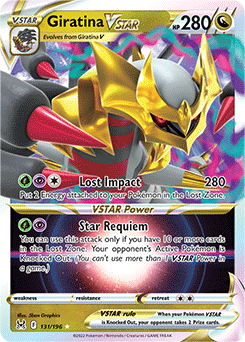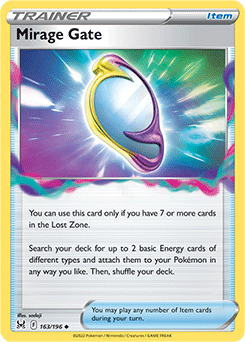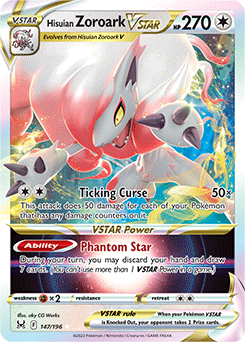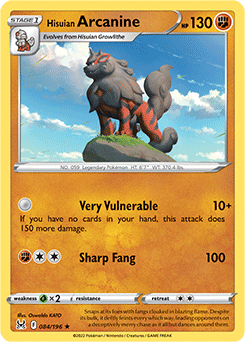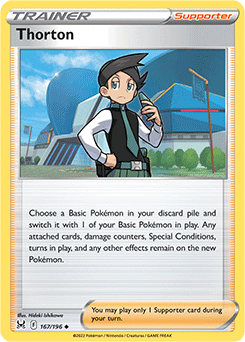Read on below to learn more about the new Pokémon TCG: Sword & Shield—Lost Origin expansion.
Eager to try something new in your next deck? Find out which cards players are keeping an eye on in the newest expansion.
By Ellis Longhurst, Contributing Writer
Create new paths to victory with cards from the Pokémon TCG: Sword & Shield—Lost Origin expansion. There are a variety of exciting Pokémon to choose from, including six new Pokémon VSTAR, that are all vying to be the top choice for players to take into battle. This set also reintroduces the Lost Zone—a place from which cards cannot be recovered. Some Pokémon will rise to the occasion and take advantage of the Lost Zone mechanic. Other Pokémon will be doomed by its existence.
Read on to find out which archetypes could emerge in Sword & Shield—Lost Origin.
Giratina VSTAR is here to send your opponent into another dimension. This Legendary Pokémon enters the battle with two powerful attacks that are sure to threaten even the most formidable foe. Its Lost Impact attack does 280 damage to the opponent’s Active Pokémon—that’s enough to Knock Out any Pokémon VSTAR in one hit!
It might seem tricky to power up Lost Impact quickly since it requires 3 Energy, including two different types. However, attacks like Arceus V’s Trinity Charge, Abilities like Leafeon V’s Greening Cells, and the Gardenia’s Vigor Supporter card can help to launch a Lost Impact as early as the second turn of the game. Protect your own Pokémon VSTAR from an early Knock Out by offering a Bench spot to the new Radiant Gardevoir.
The caveat of using Lost Impact is that you must put 2 Energy attached to your Pokémon in the Lost Zone. Unlike the discard pile, cards that are put in the Lost Zone cannot be retrieved during that game. It is important to choose these Energy carefully, otherwise your Pokémon might not have access to the correct Energy to attack next turn.
Do not let this requirement tarnish your impression of Giratina VSTAR. There are many benefits to putting cards in the Lost Zone. For example, when there are 10 or more cards in the Lost Zone, Giratina VSTAR can use its Star Requiem VSTAR Power to Knock Out the opponent’s Active Pokémon. Putting cards in the Lost Zone also enables you to explore Cramorant and Sableye as powerful single-Prize attacking options, and to mitigate the effect of Lost Impact by using the Mirage Gate Item card.
Your eyes are not deceiving you—Mirage Gate really is as useful as it appears to be. As long as you have at least 7 cards in the Lost Zone, this card allows you to search your deck for up to 2 basic Energy cards of different types and attach them to your Pokémon in any way you like. Mirage Gate undoubtedly has synergy with Giratina VSTAR, but it also creates an opportunity for other Pokémon with complex Energy requirements to have a turn in the spotlight.
The Amazing Pokémon from the Sword & Shield—Vivid Voltage and Sword & Shield—Shining Fates expansions benefit greatly from Mirage Gate. These Pokémon have powerful attacks that require two or three different types of Energy to use. You could also use Mirage Gate to attach a variety of basic Energy to Deoxys, thereby enabling you to take advantage of whichever of the Rapid Strike and Single Strike scrolls could turn the tide of a battle.
However, if your deck is relying on Mirage Gate to attach Energy to your Pokémon, it is important to find a way to put cards in the Lost Zone as quickly as possible. The Colress’s Experiment Supporter card, the Lost Vacuum Item card, and the Lost City Stadium card are all methods to achieve this. You may hear Trainers describe these three cards (along with Comfey for its Flower Selecting Ability) as the “Lost Zone package” because they will frequently appear together in decks that rely on having cards in the Lost Zone to execute their strategy.
Hisuian Zoroark VSTAR can do a great deal of damage in a very surprising way—its Ticking Curse attack does 50 damage for each of your damaged Pokémon. Putting damage counters on your Pokémon gives your opponent the illusion of control while enabling Hisuian Zoroark VSTAR to do 300 damage!
The new Gengar is a logical partner for Hisuian Zoroark VSTAR, and not just because it is also a ghost. Netherworld Gate enables you to put Gengar from your discard pile onto your Bench and put three damage counters onto it. Fortunately, there are numerous ways to put Gengar in the discard pile, including Hisuian Zoroark VSTAR’s Phantom Star VSTAR Power. Another essential card in this combination is the Gapejaw Bog Stadium card, which puts two damage counters on Basic Pokémon played from the hand onto the Bench. As a failsafe, there is also the new Damage Pump Item card to move damage counters around.
Hisuian Zoroark VSTAR requires two of any type of Energy to use Ticking Curse. This means it can use Special Energy cards like Double Turbo Energy and Powerful Colorless Energy to quickly commence attacking, and increase the amount of damage done to the opponent’s Active Pokémon, respectively. It also means that a Hisuian Zoroark VSTAR deck can accommodate a variety of complementary attackers.
Hisuian Arcanine is a Fighting-type powerhouse and contender for best in show. This Pokémon can easily Knock Out an Arceus VSTAR or Hisuian Zoroark VSTAR in one hit with its Very Vulnerable attack, and it only gives up one Prize card when Knocked Out.
Designing a Hisuian Arcanine deck, however, is no simple task. On the one paw, you need to burn all the cards from your hand every turn. On the other paw, you need to make sure you can access enough resources to set up an attack on the following turn. On yet another paw, you need to worry about what your opponent is doing. It is a good thing that Hisuian Arcanine has more than two paws.
Fortunately, Hisuian Arcanine does not require any Energy to use this attack, so there is some extra space in the deck for Pokémon and Trainer cards that meet these requirements. Supporter cards like Professor’s Research and globally playable Item cards like Quick Ball are already standard inclusions in most decks. Consider adding Peony or Galarian Meowth to assist with hand maintenance each turn.
Remember that you only draw one card at the start of your turn, and it is not always going to be the Professor’s Research off the top that Trainers dream about. Radiant Venusaur and the Rose Tower Stadium card are useful inclusions in this deck because they are multi-use ways to draw cards that are accessed from the battlefield rather than from the hand. In addition, consider exploring the Lucky Egg Item card or the new Gift Energy to draw 7 cards when your Pokémon is Knocked Out.
Longtime fans of the Pokémon TCG will recognize the similarity between Thorton and the Ninja Boy Supporter card from the Pokémon TCG: XY—Steam Siege expansion. Ninja Boy was played to great effect in a variety of decks, with each deck typically including a single copy. It follows that Thorton will find similar success.
This Supporter card is best utilized in combination with Pokémon that use Abilities to accelerate Energy onto themselves. In this way, you can quickly power up a surprising attacker and catch your opponent unawares. Think about how useful it would be if all the Metal Energy attached to Zacian V via Intrepid Sword could be transferred to an Origin Forme Dialga V in preparation for Origin Forme Dialga VSTAR’s Metal Blast or Star Chronos. Or if you could effectively power up Radiant Charizard or Yveltal using Regigigas’s Ancient Wisdom Ability. Make sure you stay alert to any tricky plays that your opponent may be preparing to make with this Supporter card!
These are just some of the incredible cards you will find in the new Sword & Shield—Lost Origin expansion. With over 190 new cards to collect—including 6 brand-new Pokémon VSTAR, 14 Pokémon V, and 1 Pokémon VMAX—there are plenty of other exciting combinations and strategies to explore. Do you have what it takes to conquer the Lost Zone?
Look for more Pokémon TCG strategy and analysis at Pokemon.com/Strategy.
About the Writer

Ellis Longhurst
Ellis Longhurst is a contributing writer for Pokemon.com. She has been competing in high-level Pokémon TCG tournaments since 2006 and creating written content for the Pokémon community since 2011. Now she brings some Australian flavour to the Play! Pokémon commentary teams at the International and World Championships.
Source: Pokemon.com
Source:Pokémon




